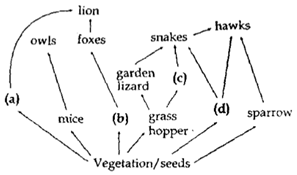Both, hydrarch and xerarch successions lead to:
1. Medium water conditions
2. Xeric conditions
3. Highly dry conditions
4. Excessive wet conditions
1. Medium water conditions
2. Xeric conditions
3. Highly dry conditions
4. Excessive wet conditions

To unlock all the explanations of 38 chapters you need to be enrolled in MasterClass Course.

To unlock all the explanations of 38 chapters you need to be enrolled in MasterClass Course.
The breakdown of detritus into smaller particles by earthworm is a process called
1. Humification
2. Fragmentation
3. Mineralisation
4. Catabolism

To unlock all the explanations of 38 chapters you need to be enrolled in MasterClass Course.

To unlock all the explanations of 38 chapters you need to be enrolled in MasterClass Course.
Which one of the following is not a gaseous biogeochemical cycle in ecosystem ?
1. Sulphur cycle
2. Phosphorus cycle
3. Nitrogen cycle
4. Carbon cycle

To unlock all the explanations of 38 chapters you need to be enrolled in MasterClass Course.

To unlock all the explanations of 38 chapters you need to be enrolled in MasterClass Course.
Identify the possible link "A" in the following food chain :
Plant → insect - frog → "A" → Eagle
1. Rabbit
2. WoIf
3. Cobra
4. Parrot
Given below is an imaginary pyramid of numbers. What could be one of the possibilities about certain organisms at some of the different levels?
| 1. | Level PC is "insects" and level SC is "small insectivorous birds". |
| 2. | Level PP is "phytoplanktons" in sea and "Whale" on top level TC |
| 3. | Level PP is "pipal trees" and level SC is "sheep". |
| 4. | Level PC is "rats" and level SC is "cats". |
Which one of the following is not a functional unit of an ecosystem
1. Energy flow
2. Decomposition
3. Productivity
4. Stratification

To unlock all the explanations of 38 chapters you need to be enrolled in MasterClass Course.

To unlock all the explanations of 38 chapters you need to be enrolled in MasterClass Course.
The upright pyramid of number is absent in
1. Pond
2. Forest
3. Lake
4. Grassland
Identify the likely organisms (a), (b), (c) and (d) in the food web shown below:

Options
|
(a) |
(b) |
(c) |
(d) |
|
|
1. |
deer |
rabbit |
frog |
rat |
|
2. |
dog |
squirrel |
bat |
deer |
|
3. |
rat |
dog |
tortoise |
crow |
|
4. |
squirrel |
cat |
rat |
pigeon |
The rate of formation of new organic matter by rabbits in grassland is called:
1. Net productivity
2. Secondary productivity
3. Net primary productivity
4. Gross primary productivity

To unlock all the explanations of 38 chapters you need to be enrolled in MasterClass Course.

To unlock all the explanations of 38 chapters you need to be enrolled in MasterClass Course.
The second stage of hydrosere is occupied by plants like :
1. Azolla
2.Typha
3.Salix
4. Vallisneria







